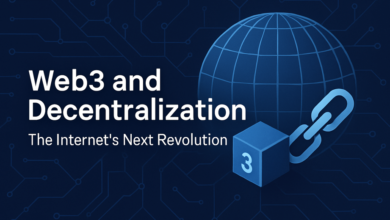Blockchain Technology: Beyond Cryptocurrencies

Introduction
Blockchain technology is most commonly associated with cryptocurrencies like Bitcoin and Ethereum, but its potential extends far beyond the financial world. The decentralized, secure, and transparent nature of blockchain has the power to revolutionize industries ranging from healthcare to supply chain management. In this article, we’ll explore what blockchain is, how it works, and its applications beyond digital currencies.
What is Blockchain Technology?
At its core, blockchain is a digital ledger technology that records transactions across a network of computers in a secure, transparent, and immutable way. The information is stored in “blocks,” and these blocks are linked together in a “chain,” hence the name “blockchain.” Each block contains a set of data, including transaction details and timestamps, and is secured using cryptography. Once a block is added to the chain, it cannot be altered or tampered with, making blockchain an incredibly secure system.
How Does Blockchain Work?
lockchain operates on a decentralized network of nodes (computers) that communicate with each other. Each node has a copy of the entire blockchain, and when a new transaction is initiated, it is validated by multiple nodes through a consensus mechanism. Once the transaction is verified, it is added to a block and appended to the blockchain. This decentralized approach ensures transparency, reduces the risk of fraud, and eliminates the need for a central authority or intermediary.
See also: How 5G Technology is Revolutionizing Communication
Key Benefits of Blockchain Technology
Security
Blockchain technology offers a high level of security due to its cryptographic nature. Since each block is connected to the previous one, altering any block in the chain would require changing every subsequent block, which is nearly impossible. This makes blockchain an ideal solution for applications that require tamper-proof data storage, such as financial transactions and personal records.
Transparency
One of the core features of blockchain is transparency. Every participant in the network has access to the entire ledger, allowing them to view and verify transactions. This transparency builds trust among users and ensures accountability. For businesses, this can lead to more efficient operations and better relationships with customers and partners.
Decentralization
Blockchain removes the need for intermediaries, such as banks or centralized authorities, by allowing peer-to-peer transactions. This decentralization reduces the risk of fraud, lowers transaction costs, and allows for faster processing. The absence of a central authority also ensures that the system is more resilient to failures or attacks.
Applications of Blockchain Technology
Supply Chain Management
One of the most promising applications of blockchain is in supply chain management. With blockchain, companies can track the movement of goods from the manufacturer to the end consumer in real-time. This ensures transparency and traceability, reducing the chances of fraud or counterfeit goods entering the market. By recording every step of the process on a blockchain, businesses can ensure the authenticity and quality of their products, which is particularly important in industries like food, pharmaceuticals, and luxury goods.
Healthcare
Blockchain can greatly improve the healthcare industry by offering a secure and transparent way to manage patient records. With blockchain, medical records can be stored in a tamper-proof system that is easily accessible by authorized medical professionals. This could reduce the administrative burden of managing paper records, improve the accuracy of medical information, and enhance patient privacy. Furthermore, blockchain can streamline the process of verifying drug provenance and tracking the effectiveness of treatments, leading to more efficient healthcare delivery.
Voting Systems
Blockchain has the potential to revolutionize voting systems by providing a secure, transparent, and tamper-resistant platform for elections. Traditional voting methods are often vulnerable to fraud and manipulation, but blockchain can eliminate these risks by securely recording votes in a decentralized ledger. Each vote would be cryptographically secured, and once cast, it cannot be altered or erased, ensuring a fair and transparent election process. Blockchain-based voting systems could increase voter confidence and participation in elections.
Smart Contracts
Smart contracts are self-executing contracts with the terms of the agreement directly written into lines of code. These contracts are automatically executed when predefined conditions are met. Blockchain technology enables smart contracts to be decentralized, secure, and tamper-proof. For example, in real estate transactions, a smart contract could automatically transfer ownership of a property once both parties fulfill their obligations, such as payment and document verification. This reduces the need for intermediaries and speeds up the transaction process.
Identity Verification
Blockchain can also be used to create secure, decentralized digital identities. By storing identity information on a blockchain, individuals can have control over their personal data, reducing the risk of identity theft and fraud. Blockchain-based identities could be used for a wide range of applications, including online authentication, financial services, and government benefits. With blockchain, users could prove their identity without the need for a centralized authority, offering a more secure and private way to manage personal information.
Real Estate Transactions
Real estate transactions often involve multiple parties, including buyers, sellers, agents, and legal professionals. Blockchain can simplify this process by providing a secure and transparent way to record ownership and transfer property. By utilizing smart contracts, the entire transaction, including payment and document verification, can be automated, reducing the time and cost involved in real estate deals. Blockchain also helps prevent fraud by ensuring that property records are transparent and tamper-proof.
Financial Services and Banking
Blockchain technology has already disrupted the financial services industry by enabling cryptocurrencies like Bitcoin and Ethereum. However, its potential goes far beyond digital currencies. Blockchain can streamline and secure a wide range of financial services, including cross-border payments, remittances, and asset management. By eliminating intermediaries, blockchain reduces transaction costs and processing times, making financial services more accessible, especially in underbanked regions. Moreover, blockchain’s transparency and security features can enhance trust in financial transactions.
Challenges and Limitations of Blockchain
Scalability
One of the main challenges of blockchain is scalability. As more transactions are added to the blockchain, the system can become slower and more costly to operate. Current blockchain networks, such as Bitcoin, can only process a limited number of transactions per second, which makes them less suitable for large-scale applications. However, solutions like sharding, layer 2 protocols, and consensus algorithm improvements are being explored to address scalability issues.
Energy Consumption
Blockchain networks, especially those that rely on proof-of-work consensus algorithms like Bitcoin, consume a significant amount of energy. This has raised concerns about the environmental impact of blockchain technology. While more energy-efficient consensus mechanisms, such as proof-of-stake, are emerging, energy consumption remains a significant challenge for widespread blockchain adoption.
Regulatory Uncertainty
Blockchain technology operates in a decentralized environment, which poses regulatory challenges for governments and organizations. The lack of regulation around blockchain-based assets, such as cryptocurrencies, makes it difficult to ensure compliance with existing laws. Additionally, the anonymity of blockchain transactions can make it easier for bad actors to engage in illicit activities. As blockchain continues to gain popularity, regulators will need to create frameworks that balance innovation with security and legal compliance.
The Future of Blockchain Technology
Blockchain technology is still in its early stages, but its potential is vast. As the technology continues to mature, we can expect to see its adoption grow across industries beyond finance, healthcare, and supply chain management. The key to unlocking blockchain’s full potential will be addressing challenges such as scalability, energy consumption, and regulatory uncertainty.
Despite these challenges, blockchain’s ability to provide transparency, security, and decentralization makes it one of the most promising technologies of the future. As more organizations explore its applications, we are likely to witness a new wave of innovation and disruption across various sectors.
Conclusion
Blockchain technology is not just about cryptocurrencies. It is a versatile, transformative tool that has the potential to revolutionize a wide range of industries. From supply chain management to healthcare, voting systems, and beyond, blockchain is poised to create more secure, transparent, and efficient systems. As the technology continues to evolve, it will likely become a cornerstone of the digital economy, providing new solutions to age-old problems and opening up new possibilities for businesses and consumers alike.






